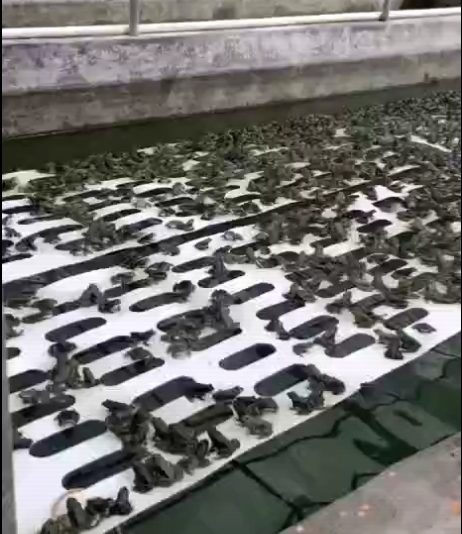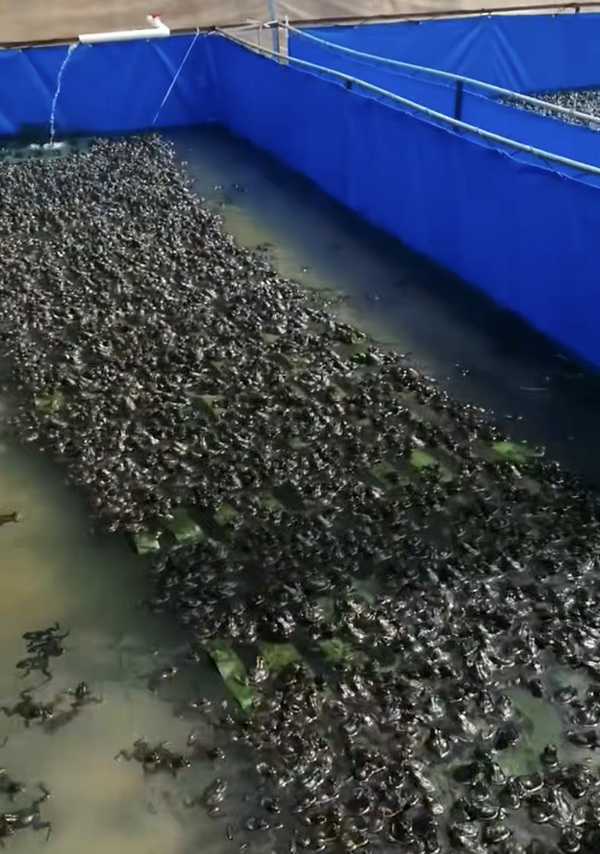Bullfrog breeding techniques
Bullfrogs are particularly tasty aquatic animals. Nutrient-rich, tender meat. Popular with hot pot lovers. But bullfrog farming techniques have been a particular problem for aquaculture farmers for years. The main reason is that the organic pollutants content of bullfrog aquaculture water is particularly high, which is difficult to deal with.
In fact, the water body of bullfrog breeding can be treated by the recirculating aquaculture system and equipment, and the discharge standards can be achieved completely. Unlike other aquatic products, bullfrogs tend to have mushy feces. Unlike other fish droppings, which are in strips. As a result, small organic particles form a gelatinous mixture with the water. Organic matter is easily decomposed in such a water environment. Organic matter is also home to many decomposing bacteria. Some microbes breed and can cause fatal damage to the bullfrog's survival and growth. And discharging such sewage will do great harm to the environment. Therefore, bullfrog farms must be equipped with aquaculture wastewater treatment equipment to pass the environmental protection.

Bullfrog breeding is generally carried out by means of floating board. Like a frog, it evolved from a tadpole to an adult frog. They're amphibians. Therefore, the problem of aeration is not a problem. They can stay in the water or they can stay on the floating board. And their skin has a certain ability to breathe. It's a rare aquatic animal that can breathe through its skin. After dissolved oxygen is not a problem, we focus on the treatment of its aquaculture wastewater.
Traditionally, the first step in aquaculture wastewater is filtration. But because of the particularity of bullfrog breeding wastewater. We need to flocculate and precipitate it initially. Most of the organic matter is flocculated and precipitated, and then it is separated. The high concentration of organic waste after precipitation can be separated by the screw stack machine. The remaining water is used again in the circulating water treatment system. Solid particles can be fermented into organic fertilizer for sale.
In bullfrog farming wastewater, the particles of organic matter are very small. So bacteria grow very quickly. Some organic matter is broken down to form soluble substances such as ammonia nitrogen or nitrite. At certain levels, these substances can cause fatal damage to bullfrogs. So. By adding beneficial fungi such as nitrifying bacteria, the biofilter is used as the carrier. Recycle the water. Under the condition of ensuring high dissolved oxygen, these harmful substances can be converted into non-toxic nitrate.

To solve the problem of microorganism breeding in water, we can use ozone to treat it. Ozone is a strong oxidant. It can kill bacteria, viruses, algae and other microorganisms by oxidation in a very short time. At the same time, it has certain effect on the removal of ammonia nitrogen and nitrite. Ozone can also react directly with organic matter in the water. Oxidize and decompose it into a colorless substance. Make the water look more transparent. And when ozone breaks down, there's only oxygen. As a result, ozone-treated water has high levels of dissolved oxygen. But the effect of ozone has a lot to do with the concentration of ozone, the way it is mixed with water, and the concentration of reducing substances in the water. It needs to be improved constantly in practical application. To reduce the cost of using ozone.
The use of circulating water treatment systems to treat bullfrog aquaculture wastewater can greatly reduce the area of so-called constructed wetlands. It can not only meet the discharge standards, but also establish a zero discharge recirculating aquaculture system through the addition of constant temperature equipment. After this treatment, the water quality is more stable. The incidence of bullfrogs is very low. The density can be staggering. At the same time, off-season sales can also effectively improve the economic benefits of livestock farms.

